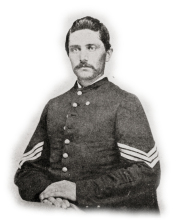During the months of July and August, 1861, the country was greatly aroused over the prospects of war. Excitement rose high when the news of the battle of Bull Run, July 21st, was flashed over the wires. I was then almost 19 and living at home on a farm near Inland, Cedar county, Iowa. Naturally I was deeply stirred over the question of war. Some of our neighbors and friends had earlier opposed the use of force in preventing secession, but I distinctly remember that my father and many neighbors and friends entertained no doubt as to the righteousness of such a course.
During these days we were at work in the harvest field. We had finished cutting our wheat and oats and during the first two weeks of August were engaged in stacking the grain. Everyone had some part in the work. Father did the stacking, while John was on the stack with him, placing the sheaves at his right hand. Albert and George drove the teams to and from the fields, while Paul and Andrew attended to watering the stock during the day.[1] Tom Toly, a strong Irishman, who had worked for us three or four summers, pitched the sheaves to father from the wagon, and Dave Cole pitched the sheaves from the shocks in the field to me on the wagon, while I arranged them on the load.
There had been some talk of raising a company of troops at Inland, but nothing had come of it. At Tipton, the county seat, a company of one hundred men was raised when the first call for volunteers was made. But as they were not then needed, they went out under the call of July 23, 1861, and became Company A of the Fifth Iowa Infantry.
I had been pondering in my mind the matter of going to join the army. On the evening of Saturday, August 10th, news came of the battle of Wilson’s Creek, and that General Lyon had been killed. The First Iowa Infantry was in that battle and made glorious history for itself and for Iowa. That fact, with the excitement over the battle itself, stirred us boys in the neighborhood, and I practically reached a decision as to what I should do.
The next day was Sunday, and everybody was talking about the battle of Wilson’s Creek. Ministers spoke of it in their sermons and prayers. It was the all-important topic of the day, and for the next three days–the 12th, 13th and 14th of August, it was the topic of conversation while we were finishing our work in the harvest field. On the next day, my birthday, I began my diary and shall now let it speak.
[1] The five boys, John, Albert, George, Paul and Andrew, are Mr. Downing’s half-brothers. They are all living at this time (March, 1916) and all reside in Iowa–Ed.
